表示同意和否的英语日常用语
学习常见的习惯用语的英文表达
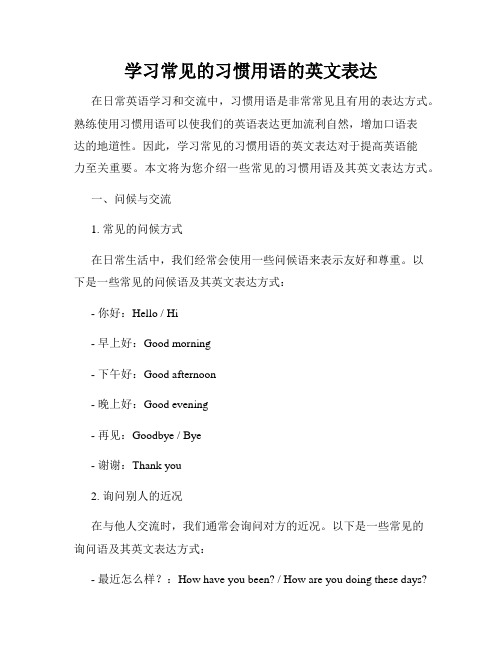
学习常见的习惯用语的英文表达在日常英语学习和交流中,习惯用语是非常常见且有用的表达方式。
熟练使用习惯用语可以使我们的英语表达更加流利自然,增加口语表达的地道性。
因此,学习常见的习惯用语的英文表达对于提高英语能力至关重要。
本文将为您介绍一些常见的习惯用语及其英文表达方式。
一、问候与交流1. 常见的问候方式在日常生活中,我们经常会使用一些问候语来表示友好和尊重。
以下是一些常见的问候语及其英文表达方式:- 你好:Hello / Hi- 早上好:Good morning- 下午好:Good afternoon- 晚上好:Good evening- 再见:Goodbye / Bye- 谢谢:Thank you2. 询问别人的近况在与他人交流时,我们通常会询问对方的近况。
以下是一些常见的询问语及其英文表达方式:- 最近怎么样?:How have you been? / How are you doing these days?- 你好吗?:How are you?- 有什么新鲜事吗?:What's new?二、描述与评论1. 描述人或事物在英语表达中,我们经常需要使用一些习惯用语来描述人或事物。
以下是一些常见的描述习语及其英文表达方式:- 外貌:as pretty as a picture(漂亮如画)- 性格:a piece of cake(温和、容易相处的)- 聪明:as sharp as a tack(聪明如锋利的图钉)- 快乐:as happy as a clam(非常快乐)2. 表示同意或不同意在交流中,表达自己的观点时,我们通常会使用一些习惯用语来表示同意或不同意。
以下是一些常见的表示同意或不同意的习语及其英文表达方式:- 同意:I couldn't agree more(我非常同意)- 不同意:I'm afraid I disagree(恐怕我不同意)三、日常生活1. 饮食方面习语在描述食物或饮食方面的习语中,我们可以使用一些常见的习语表达方式,如:- 一切顺利:smooth sailing(形容事情进行得很顺利)- 吃早饭:have breakfast(吃早饭的意思)- 慢慢吃:take your time(慢慢吃饭)2. 购物方面习语在购物过程中,我们通常也会使用一些习语来表达意愿或与商家进行交流。
口语表达表达赞同和不赞同的常用句型
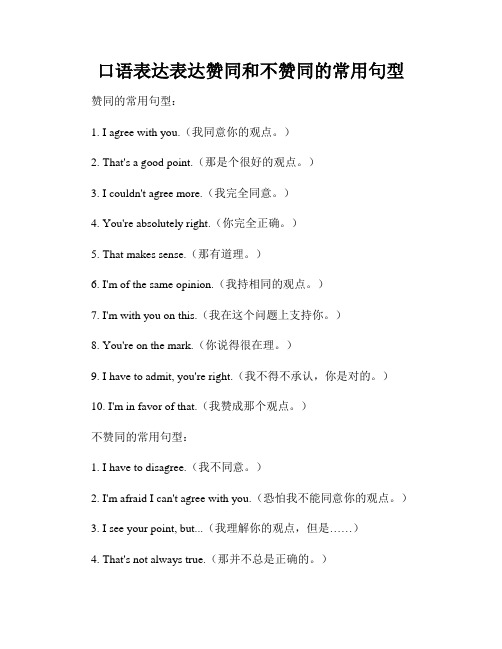
口语表达表达赞同和不赞同的常用句型赞同的常用句型:1. I agree with you.(我同意你的观点。
)2. That's a good point.(那是个很好的观点。
)3. I couldn't agree more.(我完全同意。
)4. You're absolutely right.(你完全正确。
)5. That makes sense.(那有道理。
)6. I'm of the same opinion.(我持相同的观点。
)7. I'm with you on this.(我在这个问题上支持你。
)8. You're on the mark.(你说得很在理。
)9. I have to admit, you're right.(我不得不承认,你是对的。
)10. I'm in favor of that.(我赞成那个观点。
)不赞同的常用句型:1. I have to disagree.(我不同意。
)2. I'm afraid I can't agree with you.(恐怕我不能同意你的观点。
)3. I see your point, but...(我理解你的观点,但是……)4. That's not always true.(那并不总是正确的。
)5. I'm sorry, but I disagree.(很抱歉,我不同意。
)6. I beg to differ.(我不同意。
)7. I see where you're coming from, but...(我理解你的观点,但是……)8. I'm not convinced.(我不被说服。
)9. I see what you mean, but...(我明白你的意思,但是……)10. I'm not so sure about that.(我对此并不确定。
中考英语口语中表达常考的36种类型:表示同意和不同意
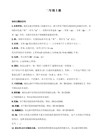
例题23:--I haven’t seen Jack for three days. Is he ill?
--________. His mother told me that he was in hospital.
A. I am afraid so B. I hope not C. I don’t expect D. I am afraid not
④I really can’t agree with you.我实在不敢恭维。
(3)表示不完全赞同的话:
①Yes, maybe.是的,也许。/
(1)表示赞同的常用语:
①Certainly./ Sure. / Of course.当然。/
允许与允许的否定情态动词用于表示允许与其否定形式的归纳

允许与允许的否定情态动词用于表示允许与其否定形式的归纳情态动词在英语中扮演着重要的角色,它们用于表示一种行为或状态的可能性、必要性、意愿等。
其中,允许和允许的否定情态动词在日常交流和写作中经常被使用。
本文将就这两个情态动词在表示允许和其否定形式时的用法进行归纳总结。
一、允许的情态动词表示允许的用法允许的情态动词包括can、may以及其过去式形式could和might。
它们在表达允许时可以根据语境和语气的不同使用。
1. can:表示能力和可能性,也可用于表示允许。
例如:- You can go to the party.(你可以去参加派对。
)- Can I use your phone?(我可以用你的手机吗?)2. may:用于正式场合,尤其是请求许可和征求意见。
例如:- May I borrow your pen, please?(请问我可以借用一下你的笔吗?) - May I suggest an alternative solution?(我可以提出一个备选方案吗?)3. could:用于委婉或客气地请求允许。
例如:- Could I have a glass of water, please?(请问我可以要一杯水吗?) - Could you please keep the noise down?(请你们能稍微安静点吗?)4. might:表示较弱或较不确定的允许。
例如:- You might take a break if you're tired.(如果你累了可以休息一下。
)- He might come to the party tonight.(他可能今晚会来参加派对。
)二、允许的否定情态动词表示不允许的用法允许的否定情态动词包括cannot(can’t)、may not以及其过去式形式could not(couldn’t)和might not(mightn’t)。
它们在表达不允许时同样可以根据语境和语气的不同使用。
英语口语常用的单词

英语口语常用的单词口语是语言的一种运用方式,不同于书面语言,更加接近人们日常生活中的交流方式。
在英语口语中,有一些单词是非常常用的,几乎在日常对话中都能听到。
掌握这些常用单词,可以更加流利地进行英语口语交流。
以下是一些英语口语中常用的单词:1. Hello你好,是最基本的打招呼方式,通常用于日常见面时。
2. Goodbye再见,用于告别的场合,表达分别的意思。
3. Thank you谢谢,用于表示感谢之情,是日常交流中必不可少的常用语。
4. Yes是,表示同意或肯定。
5. No不,表示否定或拒绝。
6. Please请,表示礼貌请求或邀请。
7. Sorry对不起,表示道歉,用于表达自己的歉意。
8. Excuse me打扰一下,常用于请求别人让路或打断别人谈话时。
9. How are you?你好吗?用于询问对方的近况,是常见的寒暄方式。
10. Good好的,表示认同或满意。
11. Bad不好,表示不满或不满意。
12. Okay好的,可以,表示同意或接受。
13. Maybe或许,表示可能性或不确定。
14. Right对,正确,表示赞同或肯定。
15. Wrong错误,表示不正确或错误。
16. Help帮助,用于请求帮助或救援。
17. Please请,用于礼貌地请求别人做某事。
18. Hurry快点,表示催促或加快动作。
19. Wait等待,用于请求暂停或延迟行动。
20. Time时间,表示时间单位或时刻。
以上是一些在英语口语中经常使用的单词,掌握这些单词可以帮助你更好地进行日常对话和交流。
继续努力学习英语,提高口语表达能力,让交流更加顺畅和自如。
中考英语日常交际用语
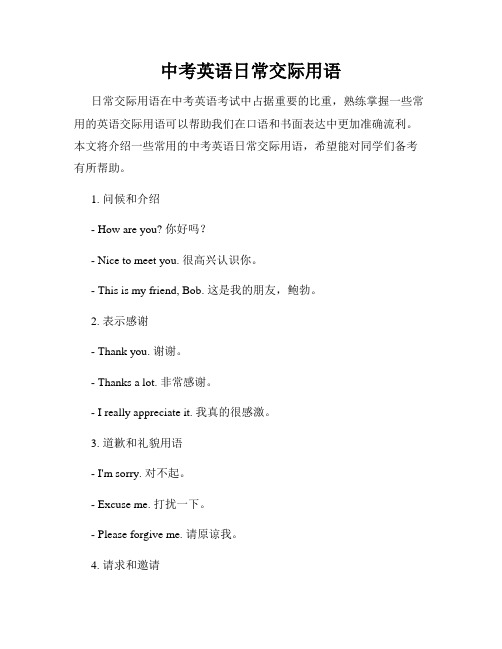
中考英语日常交际用语日常交际用语在中考英语考试中占据重要的比重,熟练掌握一些常用的英语交际用语可以帮助我们在口语和书面表达中更加准确流利。
本文将介绍一些常用的中考英语日常交际用语,希望能对同学们备考有所帮助。
1. 问候和介绍- How are you? 你好吗?- Nice to meet you. 很高兴认识你。
- This is my friend, Bob. 这是我的朋友,鲍勃。
2. 表示感谢- Thank you. 谢谢。
- Thanks a lot. 非常感谢。
- I really appreciate it. 我真的很感激。
3. 道歉和礼貌用语- I'm sorry. 对不起。
- Excuse me. 打扰一下。
- Please forgive me. 请原谅我。
4. 请求和邀请- Could you please pass me the salt? 你能给我递一下盐吗?- Would you like to join us for dinner? 你愿意和我们一起吃晚饭吗?- Can you help me with my homework? 你可以帮我做作业吗?5. 同意和拒绝- Sure, no problem. 当然,没问题。
- I'd love to. 我愿意。
- I'm sorry, but I can't. 对不起,我不能。
6. 表达喜欢和不喜欢- I really like playing basketball. 我真的很喜欢打篮球。
- I enjoy listening to music. 我喜欢听音乐。
- I don't like swimming. 我不喜欢游泳。
7. 表示意见和建议- In my opinion, we should study harder. 在我看来,我们应该更加努力学习。
- Maybe we can try a different approach. 也许我们可以尝试一种不同的方法。
口语中常用的表达方式

口语中常用的表达方式在日常生活中,我们经常需要使用口语进行交流。
不同场合下,针对不同的语境,我们需要使用各种表达方式来准确地传达出我们想要表达的信息。
以下是口语中常用的表达方式:1. 开场白在与人初次交流或者需要大声向众人发表自己的言论时,我们需要使用开场白来引起对方或者听众的注意。
开场白可以简单地说出自己的身份、目的或者一些问候语来拉近与对方的关系。
例如:- Hi, my name is John. Nice to meet you.- Good morning, everyone. I'm here today to talk about...2. 礼貌用语在日常生活中,我们需要使用礼貌用语来表示我们的谦逊和尊重。
礼貌用语可以在交流中增加气氛和融洽度。
例如:- Excuse me, do you have a moment?- Thank you for your kind help.- I'm sorry to bother you, but I need to ask you a question.3. 表达想法和意见当我们需要表达自己的想法和意见时,我们通常可以使用以下常用表达方式:- In my opinion...- I think that...- As far as I'm concerned...- It seems to me that...4. 询问和解释当我们需要了解对方的想法或者需要向对方解释某些事情时,我们可以使用以下常用表达方式:- Could you please tell me more about...?- I don't quite understand what you mean. Can you explain it in more detail?- Let me clarify what I just said...- Just to be clear, you mean...5. 表示同意或不同意当我们需要表示自己的认同或者不认同时,我们可以使用以下常用表达方式:- I agree with you.- That's a good point.- I'm afraid I don't agree with you.- I'm not sure I agree with that.6. 向对方提供帮助或建议当我们需要向对方提供帮助或者建议时,我们可以使用以下常用表达方式:- Would you like me to help you with that?- I suggest that you...- Why don't you try...?- If I were you, I would...7. 结尾语在与对方结束交流时,我们需要使用结尾语来表达感激或者再次表达对方的重要性。
口语中的常用口语表达
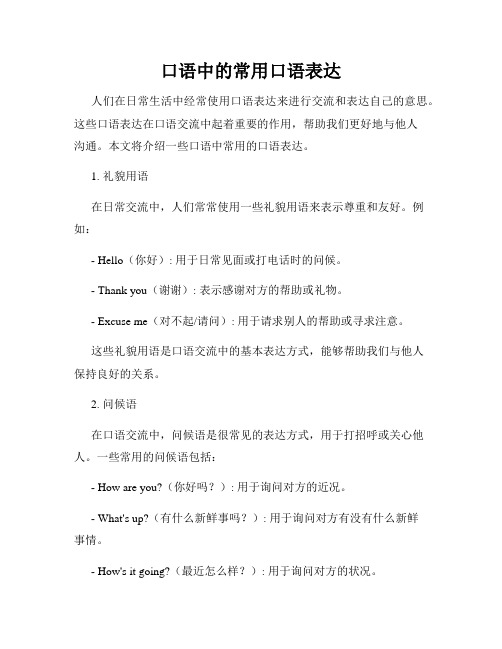
口语中的常用口语表达人们在日常生活中经常使用口语表达来进行交流和表达自己的意思。
这些口语表达在口语交流中起着重要的作用,帮助我们更好地与他人沟通。
本文将介绍一些口语中常用的口语表达。
1. 礼貌用语在日常交流中,人们常常使用一些礼貌用语来表示尊重和友好。
例如:- Hello(你好): 用于日常见面或打电话时的问候。
- Thank you(谢谢): 表示感谢对方的帮助或礼物。
- Excuse me(对不起/请问): 用于请求别人的帮助或寻求注意。
这些礼貌用语是口语交流中的基本表达方式,能够帮助我们与他人保持良好的关系。
2. 问候语在口语交流中,问候语是很常见的表达方式,用于打招呼或关心他人。
一些常用的问候语包括:- How are you?(你好吗?): 用于询问对方的近况。
- What's up?(有什么新鲜事吗?): 用于询问对方有没有什么新鲜事情。
- How's it going?(最近怎么样?): 用于询问对方的状况。
这些问候语能够让我们与他人保持友好的互动,并表达对他人的关心。
3. 感谢表达当别人帮助我们或者为我们做出贡献时,我们常常会使用口语表达来表示感谢之情。
一些常用的感谢表达包括:- Thanks a lot(非常感谢): 表示非常感谢对方的帮助。
- I really appreciate it(我非常感激): 表示对方的帮助让我们非常感激。
- You're the best(你是最棒的): 表示对对方的帮助的赞美和感激。
这些感谢表达能够让我们更好地表达自己的感激之情,同时也能够增进人际关系。
4. 同意和不同意在口语交流中,我们经常需要表示自己的观点或者对他人的观点表示同意或不同意。
以下是一些常用的表达方式:- I agree(我同意): 表示对他人观点的认同。
- I disagree(我不同意): 表示对他人观点的不认同。
- That's right(没错): 表示对他人观点的支持和认同。
- 1、下载文档前请自行甄别文档内容的完整性,平台不提供额外的编辑、内容补充、找答案等附加服务。
- 2、"仅部分预览"的文档,不可在线预览部分如存在完整性等问题,可反馈申请退款(可完整预览的文档不适用该条件!)。
- 3、如文档侵犯您的权益,请联系客服反馈,我们会尽快为您处理(人工客服工作时间:9:00-18:30)。
征求是否同意常用的句子:Do you agree? 你同意吗?Are you for or against his idea? 你是赞成还是反对他的主意?Are we all behind this?大家都同意吗?What do you think of my proposal? 你觉得我的建议怎么样?Don't you think so? 你不这么认为吗?How dose that sound? 那样行吗?Does it work for you? 你没问题吧?/你同意吗?I want a definite answer 我要一个明确的答复Is it “yes” or “no”? “是”还是“不是”?Yes or no? 是”还是“不是”?Take it or leave it. 接受还是拒绝。
Now do we have a deal or not? 我们达成一致了吗Please tell me what you honestly think 请告诉我你真是想法It doesn't answer my question 这可不算答复That's no answer 这不是答复That's not what I want to know 这不是我要知道的事情You didn't answer my question 你没有回答我的问题表达同意常用的句子:Yes. 是的。
Certainly! 当然! Exactly! 完全正确! Of course 当然Right 对You are right 你是对的Correct 正确That's correct 太正确了Good 很好Great 很棒Absolutely! 一点儿没错! Excellent 好极了Fantastic! 好极了!Definitely! 当然! 肯定地! Bingo! 对了!Me too. 我也是。
Great idea 好主意Good thinking 好想法Not bad 还行/不坏No problem here 没问题No objection 没有异议No doubt 毫无疑问/确实是这样Sounds good 听起来很好Sounds great. 听起来不错。
Sounds alright to me 听起来挺好Sounds like a good idea to me 听起来像是一个好主意Sounds like fun 好像挺有意思So be it. 就这样吧/就这么决定了。
fair enough 当然行In a word, yes 一句话,That's great 太棒了That's Right 太对了That's fair 当然可以That's a good idea 是个好主意That's the spirit! 这就对了!That's fine with me 那样很好I agree 我同意I agree with you 我同意你I totally agree with you. 我完全同意你。
I'm for it 我同I'll say! 我也要这么说!I'll take it. 我接受。
I agree with you partially 我同意部分I agree entirely 我完全同意I think so, too 我也这样认为I'll back you up! 我支持你!I'm behind you 100% 我100%的支持你I'm with you 100% 我100%的支持你I'm 100% with you on that one 在那方面我100%的支持你Your answer is to the point 你说到点子上了Your opinion is reasonable 你的意见有道理You've really hit the nail on the head 你真说到点子上了You can say that again. 我完全同意你所说的。
You did the right thing. 你做的对。
You got that right. 你是对的。
You are absolutely right. 你说的太对了。
You are partially correct 你部分是对的That's not entirely true. 也不全是。
Now you're talking! 正合我意!In a sense he's right 在某种意义上,他是对的I don't have any objection to it 我不反对You bet. 你说的没错。
I bet 应该是吧We are all for it 我们都同意Why not?为什么不?/好的Hear, hear! 说的对,说的好I'm afraid so 恐怕就是这样My answer's “yes”. 我的答案是“同意”。
表达不同意常用的句子:Negative. 否定。
Objection! 我抗议!Absolutely not. 绝对不行。
I'm don't agree 我不同意I'm don't agree with you 我不同意你To be honest, I don't really agree with you 老实说,我不太赞同你We don't agree on this point 在这点上我们意见分歧I can't agree 我不能同意I can't agree with you 我不能同意你I'm not sure I can agree 我恐怕不能同意I'm afraid disagree with you 我恐怕不同意你I'm afraid I can't quite agree with you about that. 关于这点,恐怕我不能完全赞成。
I'm afraid we can't 恐怕我们不能I'm afraid I wouldn't say that 恐怕我不敢苟同Are you crazy? 你疯了吗?You must be kidding 你一定是在开玩笑。
What are you talking about?你在说什么?I don't think so 我不这么认为I don't think that's true 我认为那不正确I don't think that's a good idea 我认为那不是一个好主意I think you'll find that's not correct 您好像说错了I don't see why 我看不出有什么理由I wouldn't say that 我不赞同。
Not really 不是那样Not exactly 不完全同意No, sir 不,先生No way 不行No good 那可不好Bad idea 馊主意Wrong 不对You're wrong. 你错了。
You got it all wrong. 你全搞错了。
Not a good idea 不是好主意That's a bad idea 那真是坏主意That's a terrible idea 那真是馊主意That's not a good idea 那可不是好主意That's not right 那是不对的That's wrong 那是错误的That's incorrect. 那是不正确的。
That won't do 那样不行Let's not 算了吧Nonsense! 胡说!That's out of the question 那根本不可能That's impossible 那怎么可能impossible 不可能I object! 我反对!Contrary to what you think. 与你想的恰恰相反。
It won't work 行不通It maybe not be that simple.可没那么简单It's not like that. 并非如此。
It's the other way around. 恰恰相反。
On the contrary. 恰恰相反。
No, quite the opposite. 不,完全相反。
Maybe not 不好That's not what you said 你不是这么说的you didn't say that 你没有那么说I didn't mean that 我不是那个意思That's not what I mean 我不是那个意思I'm not talking about that 我没说那个You misunderstood me 你误解我了Certainly not 哪儿有的事Of course not 当然不是I deny that 我否认Who said that? 谁说的?Says who? 谁说的?Not't be so sure. 别这么确定。
表达模棱两可常用的句子:Maybe yes, maybe no 也许是,也许不是Yes and no 也是也不是Half and Half 一半一半/难说It's difficult/hard to say 怎么说呢It's still up in the air. 还不确定。
I can't guarantee it 我不能保证There's no guarantee 不能保证I can't say 我说不好I couldn't say 我说不好I can't say for certain 我说不好I can't say for sure 我说不好That's about right 差不多吧Hopefully 但愿如此I doubt it 我怀疑I'm not really sure.我不能肯定I'm not so sure about that. 这个我说不准。
It depends 那的看情况I hope you're right 但愿你是对的Let me think about it 让我想想Give me time to think it over 给我时间想一下I need some time to think it over 我需要些时间考虑I'll think about it 我考虑考虑吧I'll give it some thought 我得多想想I'll think it over 我得琢磨琢磨I'll see what I can do 我的研究研究Let me sleep on it 给我一个晚上的时间考虑What do you think? 你什么意思呢?what's your answer? 你的答案是什么?What's your opinion? 你的意见呢?What's your viewpoint? 你的观点呢?What's your point of view? 你的观点呢?What's your suggestion? 你的建议呢?What do you suggest? 你建议什么?What else? 还有别的吗?Anything else? 还有别的吗?What's left? 还有别的吗?Missing anything? 还缺少什么?He gave me an ambiguous answer 他给我的回答很含糊His answer was very vague 他的回答很含糊He wasn't very clear 他不很清楚。
